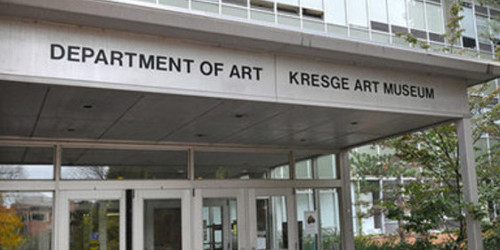
EAST LANSING – Michigan State University's Broad Art Museum is planning to lease a space across Grand River Avenue where it will showcase art from the former Kresge Art Museum, the Broad's new director, Marc-Olivier Wahler, said in an interview with City Pulse Nov. 17.
Wahler called the former Kresge collection "a pillar of the museum." He hopes to secure the space in 2017 "if all goes well." He didn't say how large the space would be and offered no more specific details, but he described the project as "very real."
"We want to open across the street with a new space where we can show this important collection," Wahler said.
The proposed new space not only has the potential to park historic works of art among the burger joints and comic book stores of Grand River Avenue's commercial strip, it would further one of Wahler's top priorities as he begins to make his mark on the Broad: extending the museum's reach into the surrounding community.
It might also heal a lingering sore spot left by the Broad's handling of the Kresge collection.
"We could attract again people who have been bitter about having donated work to the Kresge and then learning their donation is going into storage," Wahler said.
The new space may contain some contemporary art but would be "90 percent" art from the former Kresge collection, Wahler said.
"We want to engage all these people who were active with the Kresge," he said. "It's a very concrete plan. It's just a question of raising money."
The Kresge Art Museum closed its doors in July 2011, just before the Broad Art Museum, devoted to the contemporary art favored by major donor Eli Broad, opened in November 2012. By that time, the Kresge had amassed about 7,500 works of art, from Greek and Roman artifacts to Islamic manuscripts to European portraits and landscapes, as well as works by 20th century artists such as Alexander Calder and Salvador Dali.
Wahler said the former Kresge collection is part of what makes the Broad Museum a genuine museum, as opposed to an art center with rotating exhibits.
"An art center is more on the horizontal dynamic, but a museum is more on the vertical — it has roots," Wahler said. "It's very important to give this verticality of thoughts. We have a fantastic collection."
The Broad Art Museum is located at 547 E. Circle Drive in East Lansing. Call 517-884-4800 or visit http://broadmuseum.msu.edu/ for more information.
East Lansing Approves Outdoor Smoking Ban
EAST LANSING – East Lansing's City Council approved a smoking ban prohibiting the use of tobacco in city parks, plazas and recreational facilities.
On Dec. 14, the council unanimously approved the ordinance following a public hearing Dec. 13, according to East Lansing Mayor Mark Meadows.
He said council made a change to the ordinance that also prohibits smoking in public parking lots when those lots are being used for community events. Meadows said the ordinance does not include e-cigarettes or chewing tobacco.
The ordinance does not ban smoking on sidewalks, unless the smoker is within 50 feet of the entrance to a building owned by East Lansing.
Smoking tobacco in parks, plazas or recreational facilities will be considered a civil infraction, with a fine of not more than $100 for a first offense and $500 for a second offense. Prior to the approval of the new rule Dec. 13, East Lansing's ordinances banned people from smoking tobacco inside public places or within 50 feet of an entrance to a public place. The ordinance change follows the August implementation of a smoking ban on the Michigan State University campus.
State Reverses Course On Mental Health Funding Shift
LANSING – After nearly a year of debate and planning, Gov. Rick Snyder's administration has ultimately backed off a proposal to allow private health management organizations to manage public behavioral health dollars.
On Dec. 14, the state Department of Health & Human Services recommended that the state maintain separate funding for and management of physical and behavioral health care for Medicaid patients. In a 77-page, 69-recommendation draft report, DHHS said instead that patients or their family members should be in charge of choosing how and where their care is coordinated.
But Phil Kurdonowicz, DHHS policy and strategic initiatives analyst, were "written in a way to allow some flexibility" and the department did recommend pilot programs to test ways the behavioral health and physical health camps could work better together.
The segregated funding is a complete reversal from Snyder's February recommendation that management of some $2 billion in Medicaid dollars for behavioral health, substance abuse and developmental disabilities be taken from public mental health organizations and given to the private HMOs, who already manage Medicaid dollars for physical health.
Snyder had recommended the shift happen by Oct. 1, but the Legislature scrapped the plan amid criticism from behavioral health groups. Instead, lawmakers ordered DHHS to meet with stakeholders and come up with a new plan by January. The Dec. 14 report is the culmination of that so-called "Section 298 Workgroup," named after the part of the DHHS budget dealing with the issue. DHHS left many specifics unanswered. The Dec. 14 report says DHHS still must solicit proposals for pilot programs and develop ways to measure the success of those programs. The department also is soliciting public comment on the draft report, with a public forum scheduled for 2 p.m. Jan. 3 at Lansing Community College West Campus, 5708 Cornerstone Drive in Lansing. The administration originally proposed the funding shift as a way to improve coordination of care and to remove administrative layers and put more money toward services for patients.
In the Dec. 14 report, DHHS recommended another workgroup to study the current administrative setup.
"I think the 69 recommendations go a long way to that original intent," said Matt Lori, DHHS' acting senior deputy director of policy, planning, and legislative services administration. "But again, we still got a long way to go."
Tell DHHS What You Think
To read the full report, go to this story at LSJ.com or visit michigan.gov/stakeholder298. Then email comments to [email protected], mail them to the Section 298 Initiative, Policy, Planning, and Legislative Services Administration, South Grand Building, 5th Floor, 333 South Grand Avenue, Lansing, Michigan 48933, or attend a public forum at 2 p.m. Jan. 3 at the Lansing Community College West Campus, 5708 Cornerstone Drive, Lansing.









